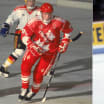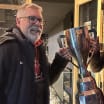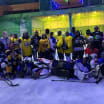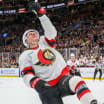Walter Gretzky dies at 82, father of Wayne Gretzky
Remembered as 'our team captain' by son, was member of Order of Canada
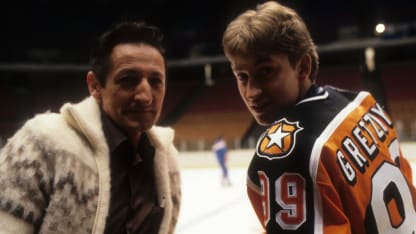
"It is with deep sadness that Janet and I share the news of the passing of my Dad,"
Wayne Gretzky
wrote on Twitter. "He bravely battled Parkinson's and other health issues these last few years, but he never let it get him down.
"For my sister and my 3 brothers, Dad was our team captain -- he guided, protected and led our family every day, every step of the way."
NHL Commissioner Gary Bettman said Walter Gretzky has a tremendous impact on the League.
"Although he never skated a shift in the National Hockey League, Walter Gretzky's influence on our League and our game was profound," Bettman said. "He embodied all that is great about being a hockey parent. Teaching the game to his children on the famed backyard rink he built in his beloved hometown of Brantford, Ontario, Walter instilled in them not only an uncommon understanding of hockey's essence, but a love and respect for the game that has become synonymous with the name Gretzky, all while ensuring that the game was fun to play."
Walter Gretzky was born Oct. 8, 1938, and raised on his parents' farm in Canning, Ontario. He was a high school athlete, excelling in track and field, but was better at hockey, starring as a goal-scorer with Junior B Woodstock.
Gretzky had eyes on bigger things in hockey, but his bid to make a Junior A team didn't pan out when chickenpox shaved weight off his slight 5-foot-9, 140-pound frame.
It was in Canning, as a teenager, that Gretzky met his future wife, Phyllis Hockin; the couple married in 1960. Five children would follow: son Wayne, daughter Kim, and sons Keith, Glen and Brent. Phyllis died in 2005.
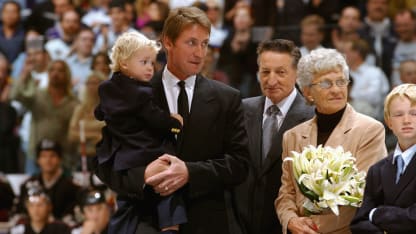
Wayne was 7 months old when Walter and Phyllis bought a home in Brantford, Ontario, 15 miles southeast of Canning. It was in the backyard that Walter would build the legendary rink where he would school Wayne on the fundamentals of hockey, his son having learned to skate about 12 miles away on the Nith River, at his grandmother's farm.
"Once we got him on skates, the tough part was getting him off them," Walter wrote in his 1985 book, "Gretzky: From the Backyard Rink to the Stanley Cup."
"He loved it. He bugged us to go to the farm or to take him to the park every night so he could skate. He couldn't get enough of it. There was a park with an outdoor rink not far from the house, so when he was 3, I started taking him there. It was closer to home, and it meant when he finished, I could get him home faster.
"It didn't work. Wayne loved it, but I darn near died. I'd take him to the park and sit in the car waiting for him to finish. The other kids would skate, pack up and go home. Wayne would still be out there. Pretty soon everybody was gone -- everybody but Wayne on the ice and this frozen lump in the car that was me. One night as I was thawing out in the in the kitchen, I gave my wife, Phyllis, the word.
"'That's it,' I said. 'I'm all through freezing my tail off. I knew he wanted to skate at the park. I didn't know he wanted to live there. Next winter, we flood the backyard and he can stay out there as long as he wants.' See? It wasn't ambition, it was survival. Not Wayne's. Mine."
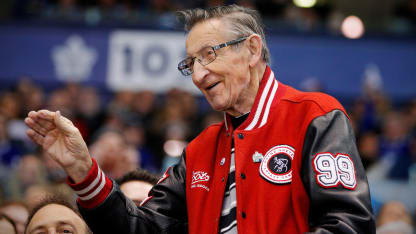
In the book, Wayne recalled the rink that would begin his path to the NHL.
"In 1979, I told a reporter that my dad and I would be on the rink four hours a day," Gretzky said. "And I was quoted, accurately, this way: 'Honest to God, it was so cold that I'd come in the house crying.' Now I can just see a bunch of kids coming in crying and hearing their dads say: 'Get back out there! Wayne Gretzky froze. He's sitting in a penthouse in Edmonton. Where the heck are you?'
"But they missed the point. They say to me, 'You practiced four hours a night,' and I say, 'Yeah, I guess I did.' But looking back at it, I wasn't practicing. If I'd thought I was practicing, I'd probably never have done it. I did it because that was what I had fun doing. I never thought, 'Well, I'll practice four hours a day today because if I do that, I'll have a chance to make the NHL.
"Oh, I cried all right. Chilblains. Every kid who ever stays out in the cold, then comes into a warm house, gets them. When your feet warm up, it hurts and itches like mad. But I didn't remember the crying. I remember the hot chocolate, and my Dad's big, strong hands holding my toes to make the cold go away."
Walter Gretzky was close to every step of his son's career, from his days as a minor hockey phenom through his professional debut in the World Hockey Association and into the NHL, where he won the Stanley Cup four times with the Edmonton Oilers; played for the Los Angeles Kings, St. Louis Blues and New York Rangers; and set NHL records for most regular-season goals (894), assists (1,963) and points (2,857).
A workplace accident in 1961 cost Walter Gretzky the hearing in his right ear, the injury leaving him for a time in a coma. He had a stroke in 1991 at age 53 that took much of his memory from the 1970s until about 2000, his rehabilitation spanning several years. Phyllis died from cancer in 2005, and in 2012 he was diagnosed with Parkinson's disease.
But he never let misfortune detour him from important charity work.
Gretzky used the experience of his stroke to benefit Canada's Heart and Stroke Foundation, volunteering as a national spokesman for the organization to raise awareness of cardiovascular health. The stroke would spawn his 2001 book "On Family, Hockey and Healing" and a 2005 made-for-TV movie based upon it, "Waking Up Wally: The Walter Gretzky Story."
He worked tirelessly with dozens of charities; among them was the CNIB (formerly known as the Canadian National Institute for the Blind), the fund-raising golf tournaments he organized through the years awarding scholarships to visually impaired students.
As well, Gretzky co-founded the Wayne and Walter Gretzky Scholarship Foundation and worked with the SCORE Program (Summer Computer Orientation Recreational Education), the latter helping hundreds of blind students learn computer skills to aid in their career placement.
A highly sought after-dinner speaker at charity functions, Walter Gretzky was named to the Order of Canada in 2007 "for his contributions to minor hockey in Canada and for his dedication to helping myriad local, provincial and national charities." In 2010, he was a final-day torch-bearer for the Vancouver Olympics, after Wayne Gretzky lit the Olympic Flame at the opening ceremony.
"For me, he was the reason I feel in love with the game of hockey," Wayne Gretzky tweeted Thursday. "He inspired me to be the best I could be not just in the game of hockey, but in life. We will miss him so much, but know that he's back with our Mom and that brings me and my family peace.
"He was truly the Great One and the proudest Canadian we know.
"We love you Dad."





